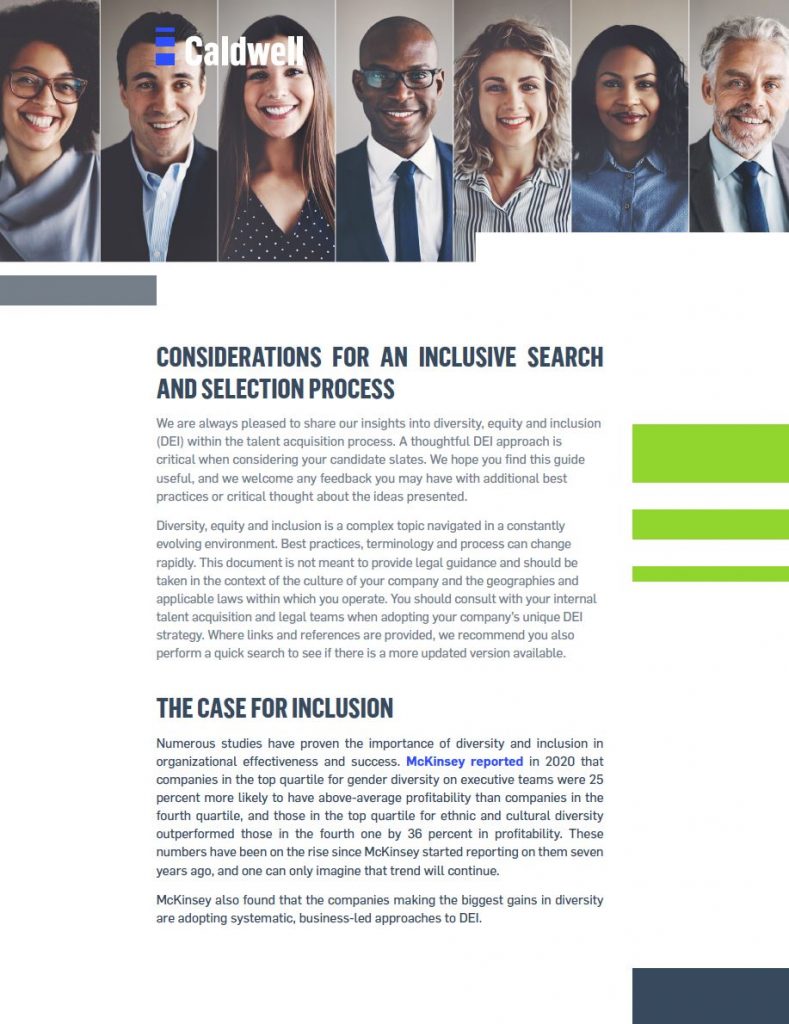In executive search, it is easy to focus on building out a diverse slate of candidates. However, if you and your organization want to approach DEI in an authentic and meaningful way, it is essential to view diversity, equity and inclusion more holistically. One way to begin, is to incorporate the following inclusive recruitment practices when conducting your search.
Find our previous article on inclusive recruitment practices to implement prior to launching your search here.
Five Inclusive Recruitment Practices:
1. Outreach
Your search consultant should demonstrate an outreach plan that includes specific strategies to target candidates who will bring diverse perspectives to the table. Your consultants should explain their methods for proactively reaching out to diverse candidates, and they may commit to ensuring that a percentage of the recommended candidates will reflect one or more dimensions of diversity.
2. DEI / unconscious bias training for the interview team
We encourage training for the interview team; your DEI expert can help. The training should cover unconscious bias and offer guidance on reducing bias when assessing resumes and interviewing.
3. Reviewing candidate backgrounds
Be aware of your own unconscious biases as you review resumes. For example, you may be predisposed to favour graduates from a particular university, or you may have a negative view of unexplained career gaps.
Fair chance/ban-the-box laws in some U.S. jurisdictions prohibit employers and recruiters from asking candidates about their criminal record before making an employment offer. These laws are intended to level the playing field for applicants who may be highly qualified but have had a criminal conviction. After a conditional job offer is issued, employers are allowed to conduct a criminal conviction history check, but the laws generally require the employer to complete an individualized assessment of the candidate’s conviction history before deciding whether to hire the candidate or formally rescind the job offer.
An excellent resource discussing fair chance laws can be found here. Please also check that you have the most updated information available from your legal team.
4. Third-party behavioral assessment
Behavioral assessment tools, such as Caldwell Analytics, provide another data point to consider in evaluating candidates. Use these tools in conjunction with your learnings from the interviews as well as some preliminary reference feedback, if available. Make sure to inquire if your assessment provider’s tool has been scientifically validated to be unbiased.
5. Negotiation and offer
Equal pay laws in many U.S. jurisdictions prohibit employers and recruiters from asking candidates to share their current or past compensation information. These laws are intended to level the playing field on compensation and encourage employers to compensate based on the requirements of the role, rather than on the candidate’s salary history.
An excellent resource to determine if you are permitted to ask for current or historical compensation can be found here. Again, please also check that you have the most updated information available from your legal team.
Compensation negotiation can become emotional; try to be objective and try to not exercise your unconscious bias.
Learn what to keep in mind when interviewing candidates and understand how to assess inclusion as a business competency in our inclusive search guide.
